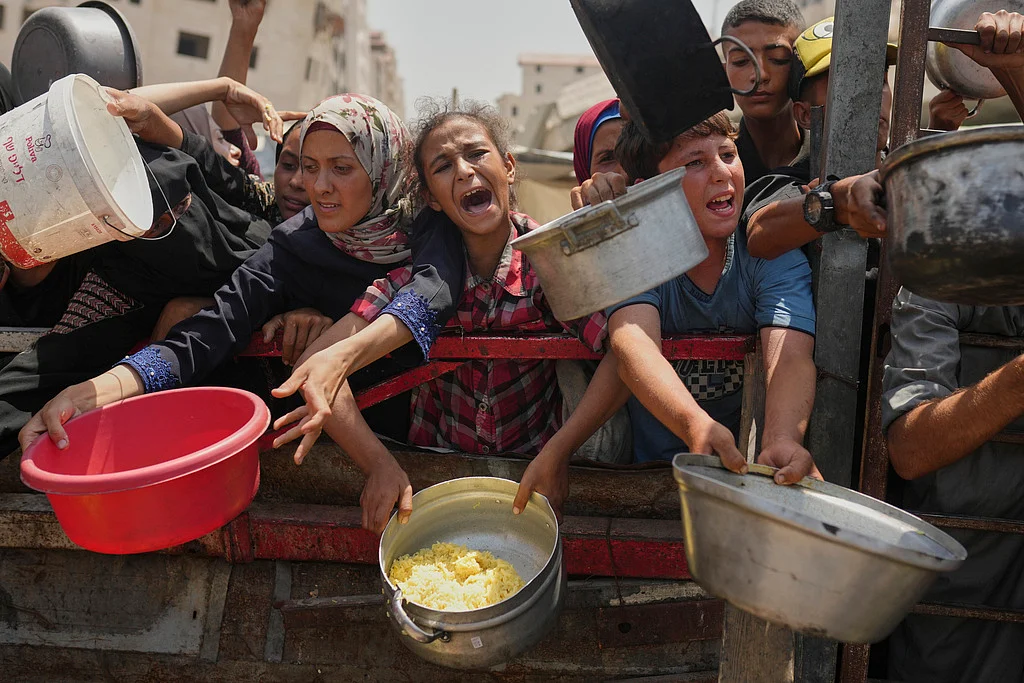What does the UN famine declaration in Gaza mean?
UN-backed food security body says thresholds met for starvation, malnutrition and death

The United Nations has formally declared a famine in Gaza, saying “systematic obstruction of aid” by Israel has left over half a million people in catastrophic hunger conditions. The declaration marks the first time famine has been confirmed in the Middle East by the world’s leading authority on food crises.
The Integrated Food Security Phase Classification (IPC), a UN-backed initiative, found famine already present in Gaza governorate — which includes Gaza City, home to nearly a million people — and warned it could spread to Deir Al Balah and Khan Yunis by the end of September. Israel has rejected the findings, calling them “based on Hamas lies.” Aid groups and UN officials, however, say the evidence meets the technical thresholds for famine and warn that without urgent action, the death toll will rise sharply.
What does it mean when the UN declares a famine?
A famine is not declared lightly. According to the IPC, three conditions must be met:
At least 20% of households face an extreme lack of food.
At least 30% of children under five suffer from acute malnutrition, or 15% by certain body-measurement standards.
At least two adults or four children under five per 10,000 people die every day from starvation or related disease.
The IPC said data collected in Gaza between July and mid-August showed these thresholds had been met, despite challenges in gathering mortality figures.
How many people are affected?
The IPC report said famine is already affecting around 500,000 people in Gaza governorate and could expand to cover nearly two-thirds of the territory by the end of September, pushing more than 600,000 people into catastrophic hunger. Aid agencies say almost the entire 2.2 million population of Gaza is experiencing severe food insecurity.
Why is this happening?
UN aid chief Tom Fletcher said the famine was “entirely preventable,” blaming Israel’s restrictions: “Food could not get through to the Palestinian territory because of systematic obstruction by Israel.” UN human rights chief Volker Turk said it was “a war crime to use starvation as a method of warfare.”
What does Israel say?
Israel has rejected the famine declaration. Prime Minister Benjamin Netanyahu said reports of starvation were “lies,” while Israel’s COGAT agency called the IPC findings “false and biased.” Israel says it has allowed more than 100,000 trucks of aid into Gaza and insists there are no restrictions on the number of aid convoys that can enter.
What role does the war play?
The war began after Hamas’s October 2023 attack, in which 1,219 people in Israel were killed and 251 hostages taken. Since then, Israeli bombardment and sieges have devastated Gaza. More than 62,000 Palestinians, mostly civilians, have been killed, according to health ministry figures considered reliable by the UN. Displacement, destruction of farmland, and the collapse of food systems have left people with little to eat.
What is the humanitarian impact?
Doctors in Gaza City report children and adults wasting away, with patients too weak to recover from infections. Families describe watching loved ones starve. UN humanitarian officials warn that Israel’s planned new offensive in Gaza City could worsen the situation: “The famine should haunt us all,” said Fletcher.
Has famine been declared elsewhere in recent years?
Yes. The IPC previously declared famines in Somalia (2011), South Sudan (2017 and 2020), and parts of Darfur (2023). Experts say Gaza now joins this list because the strict technical thresholds have been met.
- with inputs from AFP and AP
Sign up for the Daily Briefing
Get the latest news and updates straight to your inbox
Network Links
GN StoreDownload our app
© Al Nisr Publishing LLC 2025. All rights reserved.
